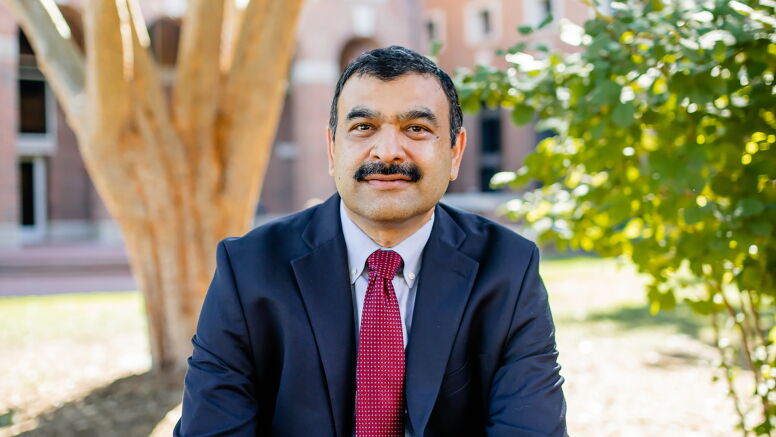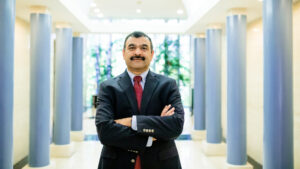News & Stories
Solving supply chain challenges

The research interests of Vinayak Deshpande – supply chain management – have been elevated from relative obscurity into the limelight.
A wave of recent disruptions, from Russia’s invasion of Ukraine to the coronavirus lockdowns across the globe, have helped turn a once niche topic into a theme of growing concern for investors and executives.
“Supply chain is a hot topic today. Not many people were talking about supply chains 25 years ago,” says Deshpande, Mann Family Distinguished Professor of Operations at UNC Kenan-Flagler Business School.
A series of successive economic and geopolitical shocks have upended the system that ensures the smooth movement of goods around the globe – forcing manufacturers to reexamine the decades-long effort to offshore supply chains as producers face delays in the arrival of components and materials from half a world away.
Deshpande’s aim is to streamline operations across the entire supply chain to make them agile and resilient to disruptions. His current empirical research documents the massive realignment of global supply chains that is currently in progress. He is studying the use of data-driven analytics and machine learning to leverage information across the entire supply chain to make them robust.
However, the prospect of some of the world’s largest corporations pulling together to share proprietary data has raised a number of security and privacy concerns. Executives do not want to give up their competitive advantage by giving away private information.

With his research specialty a red-hot topic, Vinayak Deshpande continues to shed light on the shifts and intricacies of global supply chain management.
“The biggest issue is,” he says, “how do you get the individual enterprises to take actions that go beyond what is in their own self-interest?”
The award-winning teacher and researcher has leveraged a well-established cryptographic concept – a secure multiparty computational (SMP) protocol – to help companies share data with competitors while protecting their privacy.
SMP allows each company to input private data and carry out a joint computation. No party can “see” the other’s input, but they learn the result of the computation. In this way parties can make important decisions.
Large electronics manufacturers have used the professor’s method to share their sales forecasts so their suppliers can stock enough inventory to match demand. He has consulted with a variety of companies, including Motorola and MCA Solutions.
Collaboration also is helping businesses to reduce their Scope 3 emissions, the greenhouse gases emitted through their supply chains and products. A large company might have thousands of suppliers in dozens of countries, so supply chains generate the vast majority of their total emissions.
Deshpande’s research has proven that “servicization,” a business strategy that involves selling the functionality of a product rather than the product itself, is both profitable and environmentally friendly.
Profitability can increase because a firm can tailor the service to the needs of a customer and ensure repeat business. Scope 3 emissions could be reduced because the producer retains ownership and is responsible for the maintenance of the product. As a result, the firm has a strong incentive to invest in product durability and reduce environmental impact.
“Sustainability is going to be a big challenge for companies going forward,” he says. “It is often posed as a trade-off between profits and doing the right thing,” says Deshpande. “But servicization business models are a win-win.”
His research informs his teaching. He has developed MBA electives on sustainable operations and healthcare operations, and he has plans to co-teach the new MBA elective “Analytics and Machine Learning for Managerial Decisions” with colleague Seyed Emadi.
Deshpande became a business school professor because he wanted to make a greater positive change that addresses societal challenges.
He has earned a reputation as a top scholar, having been published in premier academic journals such as Management Science and Operations Research. He is a big advocate for data-driven research, which involves the combination of real-world data and analytic techniques to guide business decisions.
The professor has turned down job offers at other academic institutions, preferring the collegiate environment at UNC Kenan-Flagler. “I have fantastic colleagues and a great set of inquisitive students. I would not trade those for any other business school.”
Initially, he was also drawn to UNC Kenan-Flagler’s strong reputation in operations. “It’s one of the best schools in the country for this academic discipline,” he says.
Deshpande bolstered that reputation when he was honored as an Edelman Award Laureate for an outstanding example of management science and operations research practice. The prestigious award recognized Deshpande’s work with the U.S. Coast Guard on a series of projects for optimizing the supply chain used for aircraft service parts.
In 2022, his research with colleague Sandeep Rath, “Data-Driven Surgical Tray Optimization to Improve Operating Room Efficiency,” was a finalist for the prestigious 2022 Innovative Applications in Analytics Award by the Institute for Operations Research and the Management Sciences.

Deshpande’s award-winning research with colleague Sandeep Rath explores how to maximize surgical efficiency as hospitals seek to cut costs.
Deshpande also was honored with the best contribution award by the Airline Group of the International Federation of Operational Research Societies, a professional body.
That was for his work on using prescriptive analytics to reduce airline flight delays, which have come under increased scrutiny in the media because of canceled flights, air traffic control delays and staff shortages. The airline industry cut tens of thousands of jobs during the pandemic and is struggling to rehire now that demand for travel has bounced back.
Deshpande’s solution is to improve flight schedules. His award-winning research shows airlines systematically underemphasize the cost of flight delays, which cause a “domino effect” whereby one delayed flight causes another, which cascades through the airline network.
Airlines will blame factors outside their control, such as weather conditions and airport congestion. However, they can reduce the cost of flight delays by building flexibility into their flight schedules, to allow more wiggle room to cope with disruption.
“If airlines place buffers in their schedules at the right points in time and at the right airports, they can decouple these domino effects and reduce operating costs, even though it increases the estimated flight time,” Deshpande says.
A related hobby of his is astronomy, the study of everything in the universe beyond Earth’s atmosphere. The amateur astronomer enjoys taking his two sons outside to view celestial objects with his 6-foot-long Dobsonian telescope, such as faraway galaxies and nebulae.
But for the most part, he prefers to train his sights on supply chains.